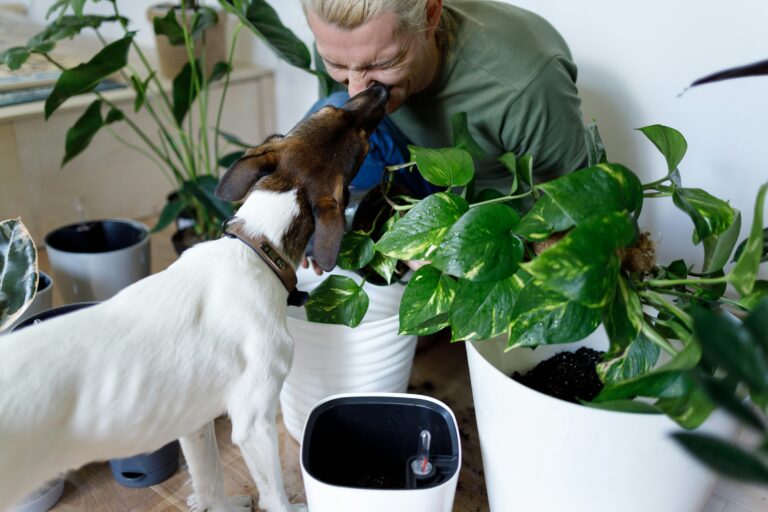Introduction
As well as market appeal the presence of green foliage inside your house will enhance environmental conditions and create better mental well-being. Dogs need Guide to Dog-Friendly Houseplants because owners of these pets must first prioritize safety over ornamentation. Dogs who ingest typical houseplants might develop various toxic reactions that range from light gastrointestinal symptoms to critical poisoning.
The post contains a selection of harmless plants for dogs which enhance home beauty while maintaining animal health. The following Guide to Dog-Friendly Houseplants provides safe plant recommendations for people who want to introduce natural elements to their home without endangering their dogs.
Why Pet-Safe Plants Matter
Dogs are curious by nature. Houseplants attract dogs through sniffing and chewing before the dogs take playful interest in them. Very small plant intake from poisonous plants can produce health complications including vomiting along with diarrhea and potentially dangerous results. Caring for dogs requires identifying the non-toxic plants because dogs naturally explore houseplants.
The following section presents several attractive indoor plants that are safe for dogs to inhabit inside your residence.
1. Spider Plant (Chlorophytum comosum)
The spider plant stands out as a very accessible indoor plant which presents no health risks to dogs along with its simple care needs. The plant cleans air while needing indirect sunlight and providing animation to any indoor space.
Care Tips:
- Water weekly
- Indirect sunlight
- Fast-growing and easily propagated
2. Areca Palm (Dypsis lutescens)
People refer to this palm as the Areca Palm but it really belongs to the butterfly palm family while offering dogs no harm and superior ability to add moisture to indoor air.
Care Tips:
- Likes bright, indirect light
- Maintain a moist but not waterlogged condition of the soil.
- Prefers higher humidity
3. Calathea (Prayer Plant)
Homeowners looking to decorate safely with house pets will find Calathea appealing due to its distinctive leaf structure and non-toxic qualities. Light changes trigger this plant to open and close its leaves which makes pet owners wish to observe this behavior repeatedly.
Care Tips:
- Moderate to low light
- Keep soil consistently moist
- Prefers high humidity
4. Bamboo Palm (Chamaedorea seifrizii)
A dog-friendly palm that brings delightful natural beauty to homes without causing any health concerns to pets. Due to its growth height the plant works well as a floor fixture in extended spaces.
Care Tips:
- Prefers indirect sunlight
- Wet the plant when the top layer of soil reaches dried state.
- Occasional pruning needed
5. African Violet (Saintpaulia)
The safe and beautiful African Violet plants provide a colored indoor alternate if you prefer such decorative items. These soft purple flower clusters will enhance the appearance of any tabletop shelves.
Read this: The Ultimate Guide to Dog-Friendly Houseplants
Care Tips:
- Prefers bright, indirect light
- Keep soil moist
- Avoid water on leaves
Tips for Keeping Your Dog Away from Plants
Big quantities of safe garden plants may result in stomach irritation even though they possess no toxicity. The following guidelines will help minimize plant eating behavior in pets:
- East animals off the plants by placing them on hanging pots or shelves at high heights.
- Implementing natural citrus spray on soil serves as an effective deterrent against pets.
- Dog owners should provide appropriate chewing objects such as pet toys to substitute the attraction of plants.
- The training of “leave it” commands functions as a solution to block your dog from approaching plants.
Conclusion
A properly researched and planned home space allows you to combine environmentally friendly features with Ultimate Guide to Dog-Friendly Houseplants characteristics. You can create beautiful attractive spaces for both you and your dog by selecting safe houseplants such as spider plants and Areca palms and Calatheas because these options remain dog-approved and friendly for their wellness.
You can find additional pet-care advice and dog-health guides and lifestyle recommendations at BarkBuddies.blog where happy dog owners meet content for their homes.



1 Comment
Pingback: 7 best Dog Anxiety Remedies: How to Calm Your Anxious Pup Naturally